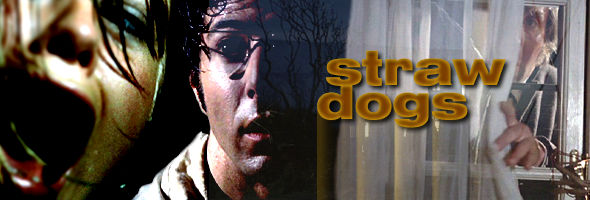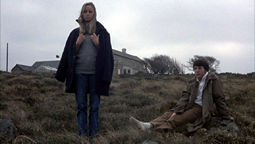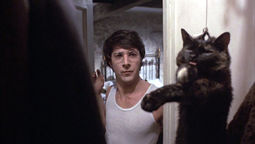
Color, 1971, 118m. / Directed by Sam Peckinpah / Starring Dustin Hoffman, Susan George / Criterion (US R1 NTSC), Fremantle (UK R2 PAL) / WS (1.85:1) (16:9)
Like such allegorical genre films as Invasion of the Body Snatchers, Straw Dogs can be read in any number of ways depending upon the viewer. While Peckinpah remains known for his steadfast macho outlook on life, his treatment of the characters in this film and the ultimate collaborative nature of the project make it difficult to evaluate, even today. Much of the controversy centers around an extended, harrowing rape sequence, disturbing more for what it implies from George's reactions than for what it actually shows. Though rarely offered parts which gave her more to do than look kittenish and scream, George is remarkable in this film, expressing tragic depths of emotion which culminate in a finale where her expressions and actions must ultimately be deciphered by looking back at the entire film. Hoffman is no less impressive, transforming subtly as his home comes under fire despite his attempts to keep justice and peace. The much ballyhooed violence still packs a wallop, with such props as barbed wire, scalding water, and a mantrap put to gruesome use in a final half hour which has justifiably landed the film in the horror genre in many reference books. If Last House on the Left can be considered a horror film, so can this one.
While both the U.S. and U.K. have special editions of the film, the extra features diverge wildly in their content. The Criterion editions contains two discs; the first is devoted entirely to the film itself, with an audio commentary by film scholar Stephen Prince. It's a solid track, peppered with useful insights from the very beginning (did you know the first shots were derived from Peckinpah's discarded, original opening for The Wild Bunch?). The feature also contains optional English subtitles, a nice plus as this marks the only captioned edition of the film available.
The Fremantle version contains the George and Melnick interviews (which were originally produced for the U.K. disc) and the Television South West footage but differs in other respects. Two commentary tracks are offered; in the first, Peckinpah biographers Paul Seydor, Garner Simmons and David Weddle practically hold a love-in for the director and pick apart the film in minute detail, while in the second, PA and dialogue director Katy Haber discusses her tempestuous relationship with Peckinpah on the set. Along with the trailer, the disc also includes radio spots, an interview with Peckinpah biographer Garner Simmons, a deleted snippet of footage in the pub, a compilation of script excerpts and stills to show deleted and unfinished footage, a history of the film's censorship troubles, a still and poster gallery, various additional Peckinpah correspondence with the likes of Richard Harris and Harold Pinter, and an 8 page booklet with liner notes by Kim Newman. Obviously one's preference will most likely be determined by the country in which they live, but both discs are well worth seeking out and represent worthy editions of a crucial, widely misunderstood film which has lost none of its, er, bite.
Perhaps the single most incendiary film released in a year notorious for its brutal British cinema (along with A Clockwork Orange, The Devils, etc.), Sam Peckinpah's Straw Dogs is perhaps the only step he could have made after the massive, ultraviolent western epic, The Wild Bunch. Rapidly becoming a new screen idol after The Graduate and Midnight Cowboy, Dustin Hoffman made a bizarre but rewarding career choice by taking on the role of David Sumner, an American physicist who moves with his wife, Amy (Susan George), to her childhood home in Cornwall. Her former boyfriend and his cronies are brought on to do handiwork on the Sumner home, and tension immediately mounts as the outsiders are circled and taunted in subtle, brutish tactics. However, David's pacificism prevents him from taking action, even when a cat winds up hanged in their closet, and Amy finds herself drifting away from her increasingly passive husband. However, events involving an accused child murder (David Warner) and a bloody brand of vigilante justice force David to confront his inner beast, with horrific results.

 Inexplicably shorn of much crucial footage from the rape scene in the U.S., Straw Dogs appeared uncut briefly on VHS before resurfaced intact again years later on laserdisc from Fox (with an isolated music and effects track) and a featureless DVD from Anchor Bay. The isolated track reappears on both the Criterion and Fremantle DVDs, both of which sport anamorphic improvements over the already excellent Anchor Bay disc. They are not the same transfer, however, with the Criterion version edging out a bit with the richest color scheme and most accurate fleshtones. The mono soundtrack was never terribly robust to begin with; Jerry Fielding's sparse but haunting score isn't exactly demo material for home theater enthusiasts but is serviced well enough. (Incidentally, the British DVD also marks the film's first intact appearance for years after countless battles with the BBFC, as the licensor refused to trim a single frame of footage.)
Inexplicably shorn of much crucial footage from the rape scene in the U.S., Straw Dogs appeared uncut briefly on VHS before resurfaced intact again years later on laserdisc from Fox (with an isolated music and effects track) and a featureless DVD from Anchor Bay. The isolated track reappears on both the Criterion and Fremantle DVDs, both of which sport anamorphic improvements over the already excellent Anchor Bay disc. They are not the same transfer, however, with the Criterion version edging out a bit with the richest color scheme and most accurate fleshtones. The mono soundtrack was never terribly robust to begin with; Jerry Fielding's sparse but haunting score isn't exactly demo material for home theater enthusiasts but is serviced well enough. (Incidentally, the British DVD also marks the film's first intact appearance for years after countless battles with the BBFC, as the licensor refused to trim a single frame of footage.)
 The second Criterion disc sports a host of extras, with a centerpiece in the form of Sam Peckinpah: Man of Iron, an 80 minute documentary featuring interviews, stills, anecdotes, and other ephemera connected to this maverick talent. Actors like Kris Kristofferson offer their own insights, and while many film clips (Pat Garrett and Billy the Kid, The Wild Bunch, etc.) had to be thrown out for legal reasons, the program serves as a fine primer for the uninitiated and an enlightening resource for the seasoned. Also included is a 7 minute Television South West behind the scenes featurette; shot in black and white, this assemblage of footage offers a fascinating look at the cast and crew at work on location. On Location: Dustin Hoffman is an educational short film following Hoffman on the set; we see him discussing his role, preparing in the morning by running through his lines, and interacting with Peckinpah and the cast. Video interviews with George and producer Daniel Melnick are also included; while Melnick offers the most useful technical information, George is by far one of the most interesting retrospective interviews around. She candidly discusses her experiences on the film, ranging from her unorthodox hiring process to her walking out after coming to verbal blows over the rape scene, which she eventually performed as she saw fit. The disc is rounded out with the theatrical trailer ("Sam Peckinpah, who uncaged The Wild Bunch, now unleashes Dustin Hoffman!"), three TV spots, and text of Peckinpah's defensive responses to reviews by Pauline Kael and Richard Schickel.
The second Criterion disc sports a host of extras, with a centerpiece in the form of Sam Peckinpah: Man of Iron, an 80 minute documentary featuring interviews, stills, anecdotes, and other ephemera connected to this maverick talent. Actors like Kris Kristofferson offer their own insights, and while many film clips (Pat Garrett and Billy the Kid, The Wild Bunch, etc.) had to be thrown out for legal reasons, the program serves as a fine primer for the uninitiated and an enlightening resource for the seasoned. Also included is a 7 minute Television South West behind the scenes featurette; shot in black and white, this assemblage of footage offers a fascinating look at the cast and crew at work on location. On Location: Dustin Hoffman is an educational short film following Hoffman on the set; we see him discussing his role, preparing in the morning by running through his lines, and interacting with Peckinpah and the cast. Video interviews with George and producer Daniel Melnick are also included; while Melnick offers the most useful technical information, George is by far one of the most interesting retrospective interviews around. She candidly discusses her experiences on the film, ranging from her unorthodox hiring process to her walking out after coming to verbal blows over the rape scene, which she eventually performed as she saw fit. The disc is rounded out with the theatrical trailer ("Sam Peckinpah, who uncaged The Wild Bunch, now unleashes Dustin Hoffman!"), three TV spots, and text of Peckinpah's defensive responses to reviews by Pauline Kael and Richard Schickel.
